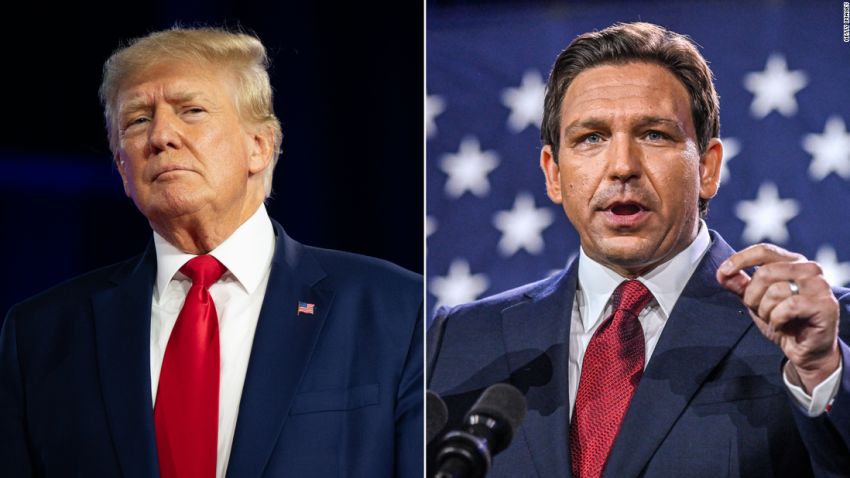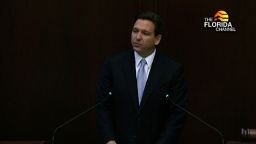Editor’s Note: Nicole Hemmer is an associate professor of history and director of the Carolyn T. and Robert M. Rogers Center for the Study of the Presidency at Vanderbilt University. She is the author of “Messengers of the Right: Conservative Media and the Transformation of American Politics” and the forthcoming “Partisans: The Conservative Revolutionaries Who Remade American Politics in the 1990s.” She cohosts the history podcasts “Past Present” and “This Day in Esoteric Political History.” The views expressed in this commentary are her own. View more opinion on CNN.
Florida Gov. Ron DeSantis has a clear strategy for building support for his presidential bid: chum the waters with red meat for the Republican base, then follow his rhetorical punches with legislative and executive action. From banning books in school libraries to flying migrants to blue states to firing a progressive prosecutor, DeSantis has displayed a Trumpian knack for driving media coverage.

But his agenda in Florida — which he now envisions as a blueprint for the rest of the United States — is not just about PR stunts: He has used his power as governor to translate provocation into policy with alarming speed. In doing so, he has emerged as a new kind of Republican governor: one who has used his state to demonstrate that he can institute a more effective and aggressive version of former President Donald Trump’s politics.
And in pursuit of these so-called culture wars, DeSantis has vastly expanded the power of the executive in Florida, which has been one of his central goals since taking office. “I want you to give me a binder of all the authorities of the governor,” he says he told the state’s general counsel shortly after becoming governor. “What can I do as a matter of constitutional right without anybody checking me?”
It turns out, quite a lot. In addition to filing complaints to shut down drag shows and firing a prosecutor he disagrees with, DeSantis has leaned on a pliant legislature, which has signed off on an agenda that allows him to seize control of municipal services and development for Disney and ban subjects taught in schools. Such significant power grabs signal an attitude toward government power that goes far beyond fights over culture, playing instead into an embrace of illiberalism that has increasingly defined much of the Republican Party.
A decade ago, Republican governors emerged as the party’s potential bridge-builders and saviors. More moderate in general than their Tea Party counterparts in Congress, more effective in pursuing popular agendas, a number of Republican governors — particularly those in blue and purple states — were lauded at the time by politicos and pundits as politicians who could build national majorities capable of effective governance. This image never provided a complete picture of what Republican governors were doing — in Wisconsin, for example, Scott Walker spent two terms demolishing unions and public universities in the state — but for those looking for a source of popular conservative governance, the governors seemed like a lifeboat in a sea of insurgent populism.
In the 2020s, Republican governors remain a rich source of party leadership, but in the post-Trump era, they look more like DeSantis than former Maryland Gov. Larry Hogan. The governor’s seat is now a perch to prove that you can manipulate all the levers of power to feed the party’s base, both in-state and nationally. DeSantis has done this with a particular flair, picking high-profile fights with Disney and Martha’s Vineyard, while also seizing on the moral panics of the moment, from “wokeness” to critical race theory to trans rights.
He’s not alone. Virginia Gov. Glenn Youngkin, whose penchant for fleece vests seems to have confused commentators into thinking he is cut from the same cloth as the purple-state Republican governors of the 2010s, has also reportedly been eyeing a presidential bid. But rumors of his moderate politics are greatly exaggerated. Youngkin’s rise to office ran through a panic about critical race theory and trans students.
While DeSantis made headlines by targeting the leadership of New College, a small public liberal arts college in Sarasota, Youngkin has been stacking the board of governors at the University of Virginia with antagonistic members devoted to remaking the school. While DeSantis grabbed the spotlight by signing legislation that restricted instruction on racism in schools and workplaces, Youngkin issued an executive order banning the teaching of critical race theory. Former UN Ambassador Nikki Haley, who announced her bid for president last month, has tracked this change as well, attempting to remake her image from the governor of South Carolina who took down the Confederate flag at the statehouse to the one who insists “wokeness is a virus more deadly than any pandemic.”
On some level, there’s not much new here: These governors are engaging in rebranded political fights that dominated politics in the 1990s. The decade witnessed history wars, with battles over what versions of the nation’s past were taught in classrooms and displayed in museums. It popularized “political correctness” as a way to dismiss concerns over language and representation. It gave rise to a new nativism that sought to bar undocumented immigrants from accessing social goods like public education. And it saw an organized movement to stop “the homosexual agenda,” as right-wing groups attempted to roll back gay-rights laws in a dozen states.
Some Republican governors of the era sought to ride those issues to the White House. California Gov. Pete Wilson campaigned for reelection in 1994 by stoking fears of undocumented immigrants. He went on to seek a ban on affirmative action programs and bilingual education in the state. His 1996 presidential bid made little headway, though, and in 2000 the party opted for a Republican governor who promised to pursue immigration reform and campaigned under the banner of compassionate conservatism.
The 1990s also offered a way of thinking about these political fights that remains with us today: culture wars. Journalists covering DeSantis have reached for the phrase again and again, seeing his focus on incendiary issues as a strategy to stir the base by focusing on intensely emotional topics. But the culture-wars framework has flaws. It suggests that the issues are a distraction from real politics, a sleight of hand to draw attention away from economic policy and focus instead on less substantive, more emotive cultural concerns.
That framing misses that the issues at the heart of the so-called culture wars are often economic issues as well. DeSantis’ attacks on public education come paired with efforts to weaken teachers’ unions (while access to public education itself has been a core part of the US economy for over a century). Limits on reproductive health care are limits on earning power and economic freedom for both women and men. Scaling back resources to address workplace discrimination cuts off opportunities for Black and other non-White workers.
Beyond that, DeSantis has framed his politics around an anti-elitist rhetoric that has significant power in US politics and culture. The introduction to his new book, “The Courage to Be Free,” is a broadside against elites that repeatedly invokes populism while avoiding the word conservatism. He positions himself as someone outside the establishment of the Republican Party, much the same way Trump, and before him, Pat Buchanan, did as well.
For now, DeSantis and Trump lead early polls for the Republican presidential nomination; around 80% of Republicans support either Trump or DeSantis. But rather than representing different visions of the Republican Party, different strands of ideology or different approaches to power, they present a united front for a party that has embraced a cruel-edged, power-hungry right-wing politics – and now is weighing who will be the most effective messenger for that brand.







